All posts by Ian Morrison
Queen’s Birthday
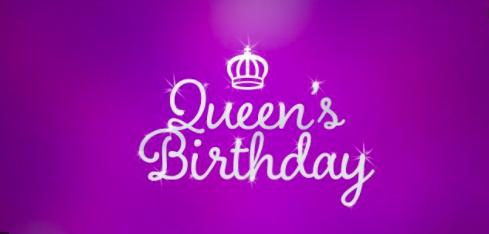
Have a great long weekend!
Latest article from School TV
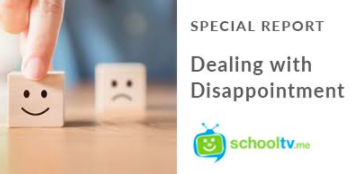
SPECIAL REPORT: Dealing with Disappointment
The Coronavirus is impacting families around the world and changing how we do things on a daily basis. In many cases, it has resulted in the indefinite postponement of many special, and often long-awaited events, such as milestone birthdays, sporting competitions, school trips and family holidays.
Disappointment can be a tricky emotion to deal with at any age, but particularly for young people whose world has been turned upside down in a matter of weeks. Although disappointment is a normal part of growing up, adults need to remember that kids have a lot of choice regarding how they respond to it. Their response will determine the impact on their future happiness. Disappointment is considered a healthy and positive emotion that is essential to a child’s emotional, intellectual and social development.
It is important to help kids manage their disappointment in order to avoid stronger emotions such as anxiety and depression. Although your first reaction may be to fix the problem, it is better to encourage them to find the words to express how they feel.
In this Special Report, parents and caregivers will be provided with some tips on how to help a child process disappointment and look at the problem objectively. We hope you take time to reflect on the information offered in this Special Report, and as always, we welcome your feedback.
If you do have any concerns about the wellbeing of your child, please contact the school for further information or seek medical or professional help.
Here is the link to your special report https://mhjc.nz.schooltv.me/
Update on move from Lockdown Level 3 to Level 2
Happy Mothers Day!
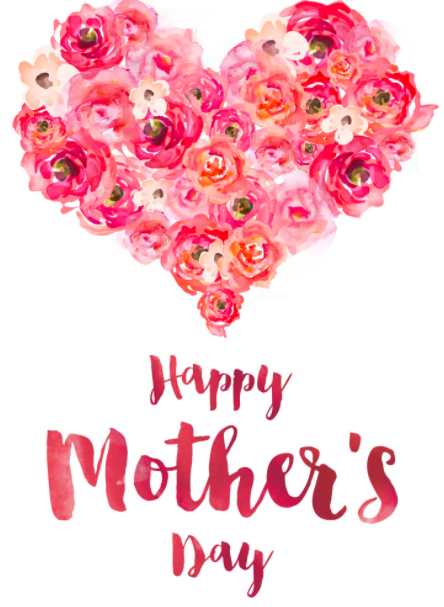
SPECIAL REPORT: Wellbeing – Checklist

A message from School TV our Wellbeing support team.
Schoolhttps://mhjc.nz.schooltv.me/wellbeing_news/special-report-wellbeing-checklist-secondary
The global pandemic is having a profound impact on our adolescents with many being forced to miss out on so many rites of passage. Some are becoming more anxious or depressed which is completely understandable given the current situation. However, should your teen display any unusual behaviour that lasts for more than 2-3 weeks, it may be a cause for concern.
Research shows there are specific risk factors that increase the likelihood of teenagers developing a mental health problem. Some are set in stone, whilst others are modifiable. Adolescents are considered to be more at risk of anxiety and depression disorders which may affect their mood, thinking and behaviour. It can impact their ability to function and perform normal activities.
It is therefore vitally important for adult carers to remain vigilant during this time for any signs of distress, even though your adolescent may not have any prior history of a mental health disorder. Early intervention, diagnosis and treatment is more important than ever. In the current climate, one useful thing you can do is help your teen focus on the things that they can control –– such as their learning, diet, exercise and sleep.
In this Special Report, adult carers will be provided with a checklist that can be used a guide in determining if there is any cause for concern. We hope you take time to reflect on the information offered in this Special Report, and as always, we welcome your feedback.
If you do have any concerns about the wellbeing of your child, please contact the school for further information or seek medical or professional help. Our Counsellor is available for email or phone support:
Savita Kesry: skesry@mhjc.school.nz
Back to our old ways or an opportunity to make positive changes?
Thanks to everyone who has helped to support our students during lockdown. I realise that parents and caregivers have had to play an even bigger role in their children’s education than before and I hope that this may strengthen the delivery of our curriculum and individual learning journeys. These times have also challenged our teachers’ ability to connect and engage students without placing undue pressure and they too are to be thanked for their efforts.
As many leaders in New Zealand and elsewhere have stated it is important we don’t get too far ahead of ourselves as the war on COVID-19 is far from over. Many, I am sure would love to quote Sir Winston Churchill who after the Battle of El Alamein, the first significant victory of the Allies over German forces in world war two, made the famous quote: “Now this is not the end. It is not even the beginning of the end. But it is, perhaps, the end of the beginning.”
I trust that everyone has used this enforced isolation to reflect on our lives and how we can make small but significant changes to promote our and others wellbeing. It is somewhat distressing to see how some people have ignored public health warnings and guidelines in their desire to return quickly to their old lifestyles.
I was also shocked and distressed to see the queues to fast food outlets which I could not help but compare to the tragic scenes of people desperate for any food in Africa and even the USA. While I enjoy a Big Mac from time to time, I could not believe that this should be such a priority that people could wait up to 5 hours for their favourite meal.
I am inspired and prefer to focus on the numerous acts of kindness and compassion being shown by so many people across the world and hope that this heightened sense of community will remain as we hopefully emerge from the crisis caused by the deadly virus. We need to learn from history again as many people in Great Britain stated that they never felt as strong a sense of unity as they did before the war and were saddened at how this spirit was lost in the peace that followed.
Next week we hope to get further guidelines on what a possible movement from Lockdown Level 3 to 2 might look like. When this happens I will inform the community as soon as possible. Our priority will be to ensure the school remains a safe site for all and that slowly but surely we will be able to transition back to face to face, exciting teaching and learning opportunities.
In the meantime, again I thank the community for its support and patience. While being with the family must have had some blessings I am sure everyone is looking forward to children returning to school in the near future. Let’s hope that our efforts to contain and eliminate the spread of the virus allow us to do this!
Kia mana ake – growing greatness.
ANZAC Day
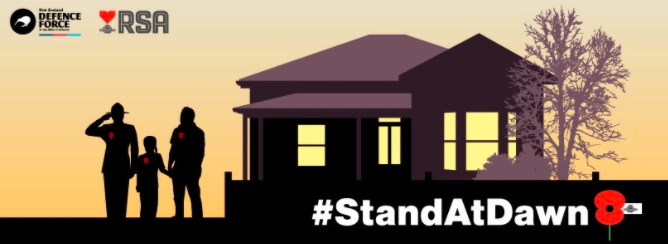
During the COVID-19 pandemic it is easy to forget other important events which have shaped our nation. The past month saw the first anniversary of the March 15 shootings of innocent worshippers at Mosques in Christchurch.
Did we truly learn the lessons of the Christchurch massacre? Are we continuing to respect and celebrate not only the Muslim faith and culture and indeed anyone who may have a different view or lifestyle to ours? I deliberately avoid the use of the word “tolerate” which has a negative association of passive, indifference and which does not actively build understanding and awareness.
With a hopeful end to the lockdown restrictions we will start to put bits of our lives back together but like post-March 15, will we be the same or have our priorities and values changed?
On ANZAC Day we pay respect to those who served in our armed forces and in particular those who were killed and paid the ultimate sacrifice for their country. We pause to reflect on how hard it must have been for entire communities who had to go without certain luxuries or even necessities when the economy was directed towards the war effort. I still have my mother’s ration card and the evacuation order which meant she had to leave her parents to leave London during the “blitz” in world war two. I compare our recent experiences of lockdown with the lives of those during both world wars who experienced 5 or 6 years of horror and sacrifice. Interestingly as a result of rationing and being provided a limited but healthy diet, the general health of UK citizens improved!
We are emerging from Lockdown Level 4 to Level 3 and we are able to do so because as a nation we have followed the advice and guidance of our leaders with very few exceptions. I am proud to be a citizen of New Zealand/Aotearoa as I witnessed and felt part of a community which made sacrifices and reached out to each other. This experience must be one which we remember as we remember other crises this nation and the world has faced. We have been successful so far, because we have trust in our leaders who have been clear and definite in their policies as we fought an invisible enemy. Importantly, our leaders have also been prepared to listen to experts and have placed the wellbeing of the community as its number one priority.
In the absence of traditional ANZAC Parades I urge everyone to spend some time tomorrow reflecting on the lessons we have learnt, to pay our respects because it is important we do not forget. Join the many who will be at the end of their driveways at 6 a.m. to honour our veterans and ex-servicemen and women. They helped to grow this nation.
Kia mana ake – Growing greatness!
Special message to our Muslim community.
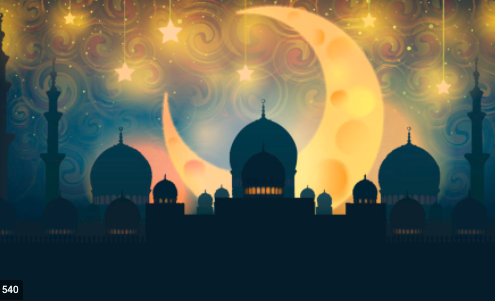
Sending best wishes and blessings on this holy month of Ramadan.
Earth Day
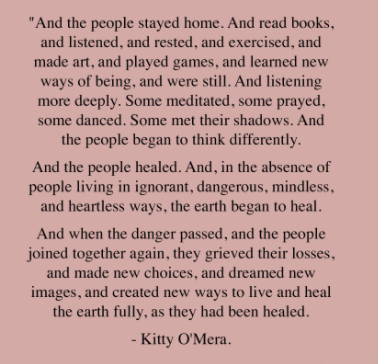
One of the advantages of the lockdown has been the reduction of human activity and the resulting lowering of carbon emissions which has cleaned the air. The sea, rivers and land have also benefited and in a sense the natural world has been able to rest a little while we fight the COVID virus.
I am lucky enough to enjoy the sights, sounds and smells of nature from my deck as a reserve borders our house. This time of reflection has been valuable and I urge all students to spend a bit of time today to quietly watch the sun rise (or set), seeing clouds blow past, listen to the wonderful bird song, wonderful silence or rustling of the leaves in the trees.
In our Charter we emphasise the need for students to connect – with each other, nature and themselves. Lockdown has given us a golden opportunity to appreciate nature and each other and as we do this we start to connect with our true selves.
We are at a critical time in the fight against COVID-19 when we start to work our way back to a “new normal”. Let us not, in our excitement, waste the opportunity to respect nature, to be true guardians or custodians of the land following the principles of “kaitiakitanga”. Conserve, protect and honour mother earth.
A final point to ponder is how well the people of New Zealand and the world have mobilised and united to fight the virus, find a vaccine and make individual and collective sacrifices during lockdown. Yet thousands die of respiratory illnesses caused by pollution, millions live in unsanitary conditions, floods and droughts threaten lives and livelihoods, whole islands and communities face the risk of losing their homes owing to climate change – can the world unite in the same way as we fought COVID-19 to preserve the environment to secure our future?
What role will each of us play to make the world a better place?
Growing greatness – Kia mana ake!

